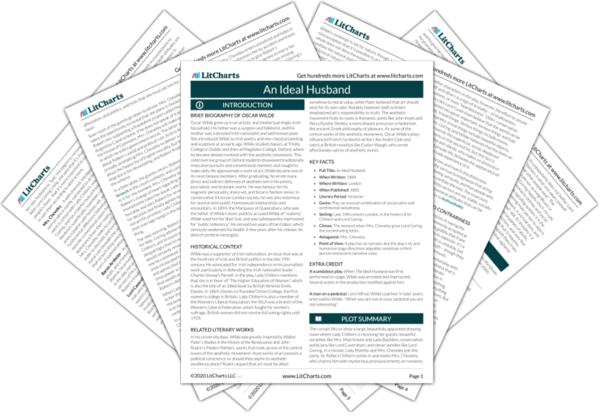Welcome to the LitCharts study guide on Oscar Wilde's An Ideal Husband. Created by the original team behind SparkNotes, LitCharts are the world's best literature guides.
An Ideal Husband: Introduction
A concise biography of Oscar Wilde plus historical and literary context for An Ideal Husband.
An Ideal Husband: Plot Summary
A quick-reference summary: An Ideal Husband on a single page.
An Ideal Husband: Detailed Summary & Analysis
In-depth summary and analysis of every scene of An Ideal Husband. Visual theme-tracking, too.
An Ideal Husband: Themes
Explanations, analysis, and visualizations of An Ideal Husband's themes.
An Ideal Husband: Quotes
An Ideal Husband's important quotes, sortable by theme, character, or scene.
An Ideal Husband: Characters
Description, analysis, and timelines for An Ideal Husband's characters.
An Ideal Husband: Symbols
Explanations of An Ideal Husband's symbols, and tracking of where they appear.
An Ideal Husband: Literary Devices
An Ideal Husband's key literary devices explained and sortable by chapter.
An Ideal Husband: Theme Wheel
An interactive data visualization of An Ideal Husband's plot and themes.
Brief Biography of Oscar Wilde
Oscar Wilde grew up in an artistic and intellectual Anglo-Irish household. His father was a surgeon and folklorist, and his mother was a devoted Irish nationalist and well-known poet. She introduced Wilde to Irish poetry and neo-classical painting and sculpture at an early age. Wilde studied classics at Trinity College in Dublin and then at Magdalen College, Oxford, where he became deeply involved with the aesthetic movement. This controversial group of Oxford students disavowed traditionally masculine pursuits and conventional manners and sought to make daily life approximate a work of art. Wilde became one of its most famous members. After graduating, he wrote many direct and indirect defenses of aestheticism in his poetry, journalism, and dramatic works. He was famous for his magnetic personality, sharp wit, and bizarre fashion sense. In conservative Victorian London society, he was also notorious for several semi-public homosexual relationships and encounters. In 1894, the Marquess of Queensbury, who was the father of Wilde’s lover, publicly accused Wilde of “sodomy.” Wilde sued him for libel, lost, and was subsequently imprisoned for “public indecency.” He served two years of hard labor, which seriously weakened his health. A few years after his release, he died of cerebral meningitis.
Get the entire An Ideal Husband LitChart as a printable PDF.

Historical Context of An Ideal Husband
Wilde was a supporter of Irish nationalism, an issue that was at the forefront of Irish and British politics in the late 19th century. He advocated for Irish independence in his journalistic work, particularly in defending the Irish nationalist leader Charles Stewart Parnell. In the play, Lady Chiltern mentions that she is in favor of “The Higher Education of Women,” which is also the title of an 1866 book by British feminist Emily Davies. In 1869, Davies co-founded Girton College, the first women’s college in Britain. Lady Chiltern is also a member of the Women’s Liberal Association; the WLA was a branch of the Women’s Liberal Federation, which fought for women’s suffrage. British women did not receive full voting rights until 1928.
Other Books Related to An Ideal Husband
In his university days, Wilde was greatly inspired by Walter Pater’s Studies in the History of the Renaissance and John Ruskin’s Modern Painters, works that took up one of the central issues of the aesthetic movement: must works of art possess a political conscience, or should they aspire to aesthetic excellence alone? Ruskin argued that art must be allied somehow to moral value, while Pater believed that art should exist for its own sake. Notably, however, both scholars emphasized art’s responsibility to truth. The aesthetic movement finds its roots in Romantic poets like John Keats and Percy Bysshe Shelley; a more distant precursor is hedonism, the ancient Greek philosophy of pleasure. As some of the central works of the aesthetic movement, Oscar Wilde’s plays influenced French Symbolist writers like André Gide and satirical British novelists like Evelyn Waugh, who wrote affectionate satires of aesthetic mores.
Key Facts about An Ideal Husband
- Full Title: An Ideal Husband
- When Written: 1893-1894
- Where Written: London
- When Published: 1895
- Literary Period: Victorian
- Genre: Play; an unusual combination of social satire and sentimental melodrama.
- Setting: Late 19th century London, in the homes of Sir Chiltern and Lord Goring.
- Climax: The moment when Mrs. Cheveley gives Lord Goring the incriminating letter.
- Antagonist: Mrs. Cheveley
- Point of View: A play has no narrator, but this play’s sly and humorous stage directions arguably constitute a third-person omniscient narrative voice.
Extra Credit for An Ideal Husband
A scandalous play. When The Ideal Husband was first performed on stage, Wilde was arrested and imprisoned. Several actors in the production testified against him.
A man on a pedestal. Lord Alfred, Wilde’s partner in later years, once said to Wilde: “When you are not on your pedestal you are not interesting."












